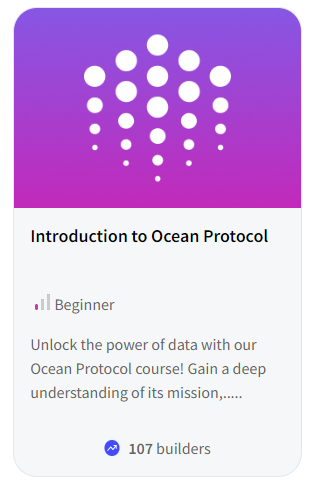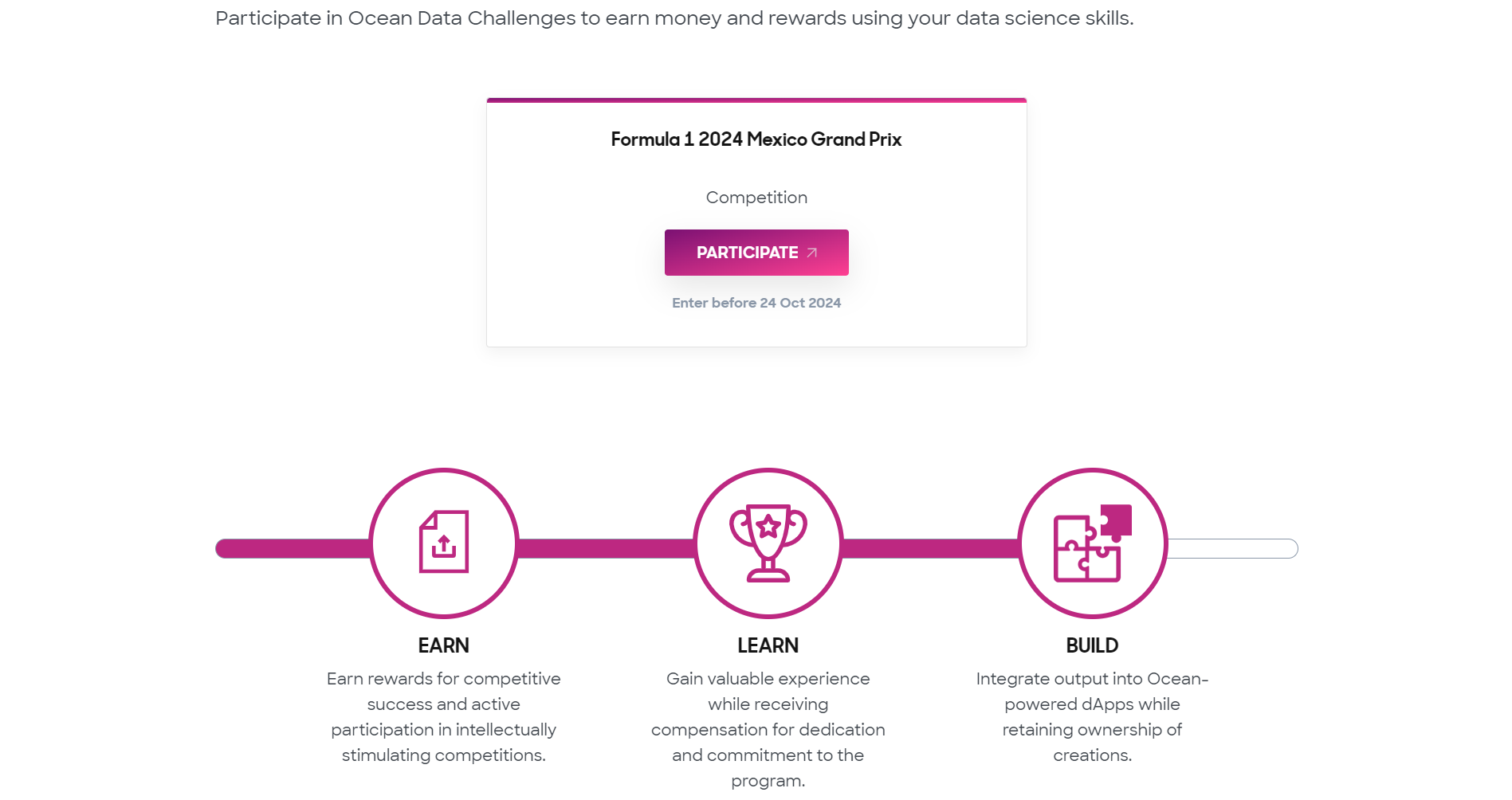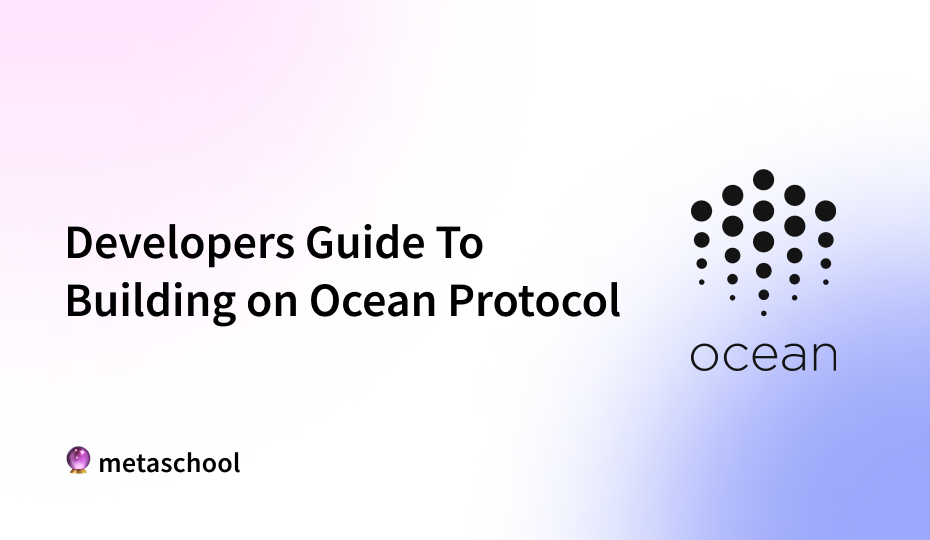Table of Contents
Ocean Protocol is a decentralized platform built to unlock data for AI and machine learning while ensuring privacy, security, and data sovereignty. It empowers data owners to share their data within a controlled environment using Compute-to-Data, a feature that allows AI models to run computations on data without exposing the data itself. This ensures a balance between data privacy and utility, opening new opportunities for secure data monetization across sectors like finance, healthcare, and AI research.
Ocean’s Architecture and Tokenization
Ocean Protocol leverages blockchain technology to tokenize datasets into datatokens, which can be used to buy and sell data in decentralized marketplaces. This tokenization allows data to be monetized without being directly shared, preserving privacy while enabling secure transactions. Additionally, Ocean integrates data NFTs, offering traceability and ownership features that enhance control over datasets. Developers benefit from the platform’s support for interoperability, which provides tools and libraries that make seamless interaction with smart contracts possible, helping developers build scalable decentralized applications (dApps).

Key Features for Developers
Data Tokens and NFTs
- Data Tokens and NFTs
Ocean allows datasets to be turned into datatokens, providing tokenized access that can be bought and sold in decentralized marketplaces. Along with data NFTs, developers can facilitate the trade of data as a digital asset while maintaining ownership, traceability, and verification of datasets. This allows for greater flexibility in managing and monetizing data. - Ocean.js and Ocean.py
Ocean.js is a JavaScript library that simplifies interaction with Ocean Protocol’s smart contracts. It allows developers to publish datasets, manage datatokens, and handle transactions in decentralized marketplaces. For Python developers, Ocean.py offers similar functionality, enabling interaction with the Ocean network for publishing datasets, managing tokens, and executing on-chain transactions. This versatility allows developers to use the language they are most comfortable with while working with Ocean. - Compute-to-Data
Ocean’s Compute-to-Data feature ensures that AI models can perform computations on datasets without exposing the underlying data, thus maintaining privacy. This is ideal for sensitive industries like healthcare, finance, and proprietary research, where data privacy is critical but the utility of data for AI model training remains high. - Decentralized Data Marketplaces
Developers can build decentralized data marketplaces where data owners can publish, sell, and manage their datasets. Powered by Ocean’s smart contracts, these marketplaces enable secure, transparent, and efficient transactions. Notable live examples include Acentrik Market, designed for enterprise needs, and the Ocean Market, which offers a general-purpose decentralized marketplace. These marketplaces foster a thriving data economy, providing liquidity to data that would otherwise be locked away. - Token-Gated dApps and REST APIs
Ocean supports the creation of token-gated decentralized applications (dApps) and REST APIs. This means developers can monetize their dApps or REST APIs by limiting access to those who hold specific tokens. Examples include dApps like Autobot (analytics) and Ocean Waves (music), both of which utilize token-gated access to monetize services. Additionally, token-gated feeds, like Ocean Predictoor (AI prediction feeds), demonstrate how token gating can enhance monetization in various sectors. - Enhanced Privacy for User Data
Rather than storing user profile data on centralized servers, Ocean enables developers to store it on-chain where it is encrypted by the user’s wallet. This on-chain storage allows for just-in-time decryption for the application, reducing exposure to potential security breaches while maintaining functionality. This solution mitigates the risk of centralized server storage, offering a decentralized, privacy-focused alternative for applications managing user data.
Getting Started with Ocean Protocol
Ocean offers various tools for developers at different levels of interaction:
- App Level: Developers can use Ocean templates for building basic dApps quickly.
- Library Level: For more control, developers can use Ocean.js or Ocean.py libraries to manage frontend applications or backend tasks.
- Contract Level: For advanced use, developers can directly interact with Ocean’s smart contracts on Ethereum or other supported chains.
Ocean’s ecosystem also includes important components like:
- Barge: A local test chain for developers to test their applications.
- Ocean Subgraph: A service that retrieves event data from the blockchain for analytics or further processing.
- Ocean CLI: A command-line tool that simplifies managing Ocean services.
- Aquarius: A metadata cache that facilitates fast and secure metadata retrieval.
- Provider: A service for handling access control, ensuring that only authorized users can interact with specific datasets or services.
Use Cases
- Data Monetization: Ocean Protocol allows data owners to tokenize and sell their datasets, providing liquidity to data assets.
- AI Model Training: With Compute-to-Data, developers can train AI models on secure, sensitive data without exposing it, making it useful in privacy-conscious industries like healthcare, finance, and research.
- Private User Data: By encrypting user data on-chain and decrypting it only when needed, Ocean ensures that sensitive information remains secure while providing the flexibility of decentralized applications.
- Decentralized Governance: Ocean enables decentralized governance of data-sharing ecosystems, ensuring full transparency and security in data transactions and decision-making processes.

Ocean Protocol Course on Metaschool
In the Introduction to Ocean Protocol course available on Metaschool, you will cover the origin of Ocean Protocol, the problems it aims to solve, and its core mission of unlocking the value of data for AI. You’ll then dive into Ocean Protocol’s ecosystem and architecture, learning about important components such as Data NFTs, Datatokens, and the innovative Compute-to-Data feature, which ensures secure and efficient data sharing.
This course will also explore real-world use cases and opportunities within the Ocean ecosystem, giving developers insight into how they can contribute to this decentralized data economy. Finally, the course will wrap up by summarizing key concepts and preparing you to apply your newfound knowledge. Upon completion, you’ll receive a unique NFT as proof, unlocking further benefits in the Metaschool community.
Who is this course for?
- Beginners and blockchain enthusiasts excited to explore how Ocean Protocol empowers AI through decentralized data sharing.
- Developers interested in contributing to the Ocean Protocol ecosystem.
Difficulty Level: Beginner to Intermediate
Ready for a challenge?
Join the Ocean Data Challenge program and put your skills to the test! This initiative not only encourages data-driven insights but also rewards participants with prizes for their innovative solutions. Engage in active challenges like the Formula 1 2024 Mexico Grand Prix, where you can earn rewards while honing your expertise in data science.

As you participate, you’ll gain valuable experience, retain ownership of your creations, and have the chance to climb the 2024 leaderboard. Take advantage of this opportunity to build, learn, and explore the New Data Economy with Ocean Protocol!
If you’re interested in organizing your own data challenge, Ocean Protocol provides a fantastic opportunity to harness the expertise of the Ocean community to tackle complex business problems. To get started, fill out the official form provided on their website.
Conclusion
Ocean Protocol provides developers with a powerful, privacy-focused infrastructure to build decentralized data-driven applications. The platform’s focus on privacy-preserving data exchange, tokenization of data, and decentralized marketplaces makes it ideal for sectors like AI, data science, healthcare, and finance. Ocean’s robust ecosystem, including tools like Ocean.js, Compute-to-Data, and token-gated dApps, offers endless possibilities for developers to innovate in the AI and blockchain space.
For more details on how to start building with Ocean Protocol, developers can visit the Developer Hub, where they’ll find extensive tutorials and resources tailored to their needs.
FAQs
What is Ocean Protocol built on?
Ocean Protocol is built on blockchain technology, specifically utilizing Ethereum and its own smart contracts to enable secure, decentralized data sharing and monetization. It also supports cross-chain interoperability, enhancing its functionality and reach within the decentralized ecosystem.
Is Ocean Protocol a real company?
Yes, Ocean Protocol is a real company. It was founded in 2017 and operates as an open-source project that aims to create a decentralized data exchange protocol, allowing individuals and organizations to share and monetize data securely.
Does Ocean Protocol have a future?
Ocean Protocol is positioned for growth due to the increasing demand for data privacy, security, and decentralized solutions in AI and machine learning. Its innovative features and adaptability make it a promising player in the evolving data economy, attracting interest from developers and businesses alike.
Is Ocean Protocol an AI coin?
Ocean Protocol is a blockchain protocol that facilitates the secure exchange of data for AI and machine learning applications. While it plays a significant role in enabling AI by providing access to data, it is primarily a decentralized data exchange platform.
